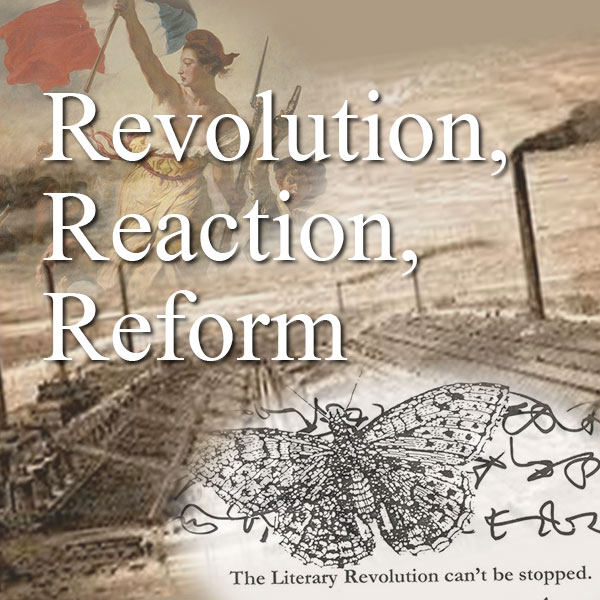MSSU ENG272 - Spring 2025 Dashboard
Description
 British Literature II: Revolution, Reaction, Reform examines British literature from the late eighteenth century to the present, a period that witnessed the American and French Revolutions, slave revolts such as the Haitian Revolution, a “revolution in female manners,” the Industrial Revolution, the twentieth-century revolutionary wave in Europe, as well as World War I and World War II, and, of course, artistic revolutions. We will consider how the authors and literary works of this period might be reacting to change, advocating for reform, or participating in literary revolutions—whether revolution is understood in the sense of “revolving” or of “revolting,” going full circle to return to a previous (more perfect?) time or experiencing/effecting a great alteration or rupture.
British Literature II: Revolution, Reaction, Reform examines British literature from the late eighteenth century to the present, a period that witnessed the American and French Revolutions, slave revolts such as the Haitian Revolution, a “revolution in female manners,” the Industrial Revolution, the twentieth-century revolutionary wave in Europe, as well as World War I and World War II, and, of course, artistic revolutions. We will consider how the authors and literary works of this period might be reacting to change, advocating for reform, or participating in literary revolutions—whether revolution is understood in the sense of “revolving” or of “revolting,” going full circle to return to a previous (more perfect?) time or experiencing/effecting a great alteration or rupture.
Access the works for annotations assignments in COVE Studio here: ENG 272, Spring 2025
The digital edition of Frankenstein for annotations and the map project can be found here: Mary Shelley, Frankenstein (1818)
Galleries, Timelines, and Maps
Individual Entries
Adichie has lived in Lagos on and off for over a decade. Her experiences in Nigeria's largest city have provided rich material for her writing, capturing the vibrant and dynamic essence of Lagos.
Lagos, Nigeria, is a bustling metropolis and the largest city in the country, known for its vibrant culture, economic significance, and dynamic lifestyle. As a major financial center in Africa, Lagos is home to numerous multinational corporations, thriving markets, and a diverse population. The city's energy is palpable, with its busy streets, lively music scene, and rich culinary offerings. Lagos also serves as a cultural hub, hosting various festivals, art exhibitions, and literary events that celebrate Nigerian heritage and creativity. Chimamanda Ngozi Adichie has a strong connection to Lagos, where she has lived intermittently for over a decade. Her experiences in this vibrant city have deeply influenced her writing, capturing the essence of Lagos in her novels and essays. The...
moreWillimantic, located in Windham, Connecticut, is a town with a rich industrial history and diverse cultural heritage. Known as "Thread City," it was a major center for the textile industry in the 19th century, particularly due to the American Thread Company's mills. Originally incorporated as a city in 1893, Willimantic was later reabsorbed into the town of Windham in the 1980s. Situated along the Willimantic River, the town boasts a population of approximately 18,149 as of the 2020 census. Willimantic is renowned for its Victorian-era architecture, including notable sites like the Willimantic Footbridge and the "Frog Bridge." It is also home to Eastern Connecticut State University and the Windham Textile and History Museum. The town's community is characterized by its ethnic diversity, historically populated by various groups such as Western European, French Canadian, Eastern European, and Puerto Rican immigrants. Willimantic's blend of historical significance and cultural...
morePhiladelphia, often referred to as "Philly," is the largest city in Pennsylvania and the sixth-most populous city in the United States. Philadelphia was founded in 1682 by William Penn, an English Quaker, and it played a crucial role during the American Revolution. The city is home to Independence Hall, where the Declaration of Independence and the U.S. Constitution were debated and adopted. The Liberty Bell, a symbol of American independence, is also located here. The city is a major educational hub with institutions like the University of Pennsylvania and Temple University. Philadelphia has a diverse economy with strengths in education, healthcare, biotechnology, and financial services.

Adichie left Nigeria at the age of 19 to study at Drexel...
more
Nsukka is a town and Local Government Area in Enugu State, Nigeria. It is known for its rich cultural heritage and educational significance. As of the 2006 census, the population of the local government area was around 309,633. Established in 1960, it was the first university in Nigeria after independence. The university is a major educational hub and contributes significantly to the town's identity. The people in Nsukka speak central Igbo and the Nsukka dialect, a sub-dialect of the larger Igbo language. Nsukka has a history of ancient wars and expansionist activities in the 18th and 19th centuries. Nsukka is a vibrant town with a blend of educational, cultural, and economic activities.
Adichie grew up in Nsukka, although she was born in Enugu in 1977. Growing up on...
more
Enugu, often referred to as the "Coal City," is the capital of Enugu State in southeastern Nigeria. The name "Enugu" comes from the Igbo words "Énú Ụ́gwụ́," meaning "hill top," reflecting the city's hilly geography. Nugu was established as a township in 1917 and became known for its coal mining industry. The city played a significant role in Nigeria's anti-colonial resistance, notably during the 1949 Iva Valley massacre of striking coal miners. Historically, coal mining was a major industry, but today Enugu's economy is more diversified, including sectors like manufacturing, services, and education. Enugu is predominantly inhabited by the Igbo people, and the city is known for its vibrant cultural scene, including music, dance, and festivals.
“Enugu | Nigeria, Map, &...
more